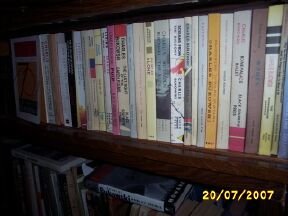In Up To His Ears
....
Buk quote:
"I'm a very common simple man. I do have genius, but with a very low common denominator. I'm simple, I'm not profound. My genius stems from an interest in whores, working men, streetcar drivers - lonely beaten-down people. And those are the people I'd like to see reading my stuff, and I don't want to see too many learned comments, too much criticism, or too much praise get between me and them"
from "Sunlight here I am", page 166.
Bukfan, thanks for posting this revealing quote, had not come across it before. Here's the man himself observing himself better than anyone 'learned' could ever possibly do, imo, and why such an outside analysis from a critic can sometimes be injurious and superfluous to those readers who may not have already made up their minds about this Bukowski fellow.
As I've stuck my neck out to mention before, sometimes the scholarly discourse on a man, beyond a certain point, can end up coming between the reader and what's read, and it's the rare biographer whose spirit is as broad and sympathetic as the man or woman he/she is writing about. (But it's possible.)
Inadvertently such academic chronographers end up making the subject of their criticisms seem less worthy of being read, rather than more, and they don't even realize it at the time they are doing it: their appreciation of their subject is full of secret doubts and reservations, and the biographer appears unable to integrate the subject's genius and his short-comings in a fully integrated manner, instead of either/or. Without going into specific instances for now, I've seen this in the clubhouse on a number of occasions, and there appears to be no cure for it except for one to read more good biographies and get past the reservations about being fooled, deceived or taken advantage of by the subject under analysis. (I'm not worried myself about being fooled, if the lie says something true about life.)
It's not that the subject is free of interesting faults"”of course not"”and the faults and short-comings are what help to unfurl the subject's genius. But the problem is in assessing what the true faults are.
In Bukowski's case, some of his themes related to outward male dominance"”such is in some of the stories in
South Of No North"”could be viewed as being a short-sighted, limited or immature view of female sexuality and fickleness, at least on the surface, though there can also be truth to it! Nevertheless, these themes have called out some of Bukowski's detractors, and it's one reason why he has been rejected as a serious writer by those who are too impatient or short-sighted to hang in there until they come across the depth of feeling and insight in so many of his great poems. I consider "Ignus Fatuus," off the CD
At Terror Street and Agony Way, to be one of the great poems, on what real death is, in the English language. But I believe that most academics would never admit to it being a great poem if they had known who wrote it before reading it themselves. That's how the mind screens out threats to itself: by comparing something new to their standard frame of reference and not being able to take it in.
The good news is that there should always be room in the universities for contemporary literature, no matter how bad it sometimes is, because it's a reflection of life now and not 200 years ago. If the academic boundaries aren't stretched by the courageous academics or biographers, preferably with a truly intigrated understanding of the person they are writting about, some students might never be exposed to the good stuff: the good man Bukowski, and a few others.
Written just for the hell of it.
Poptop

